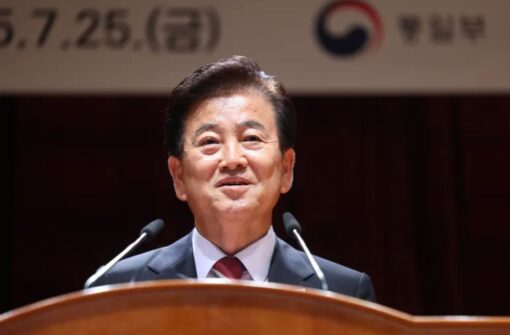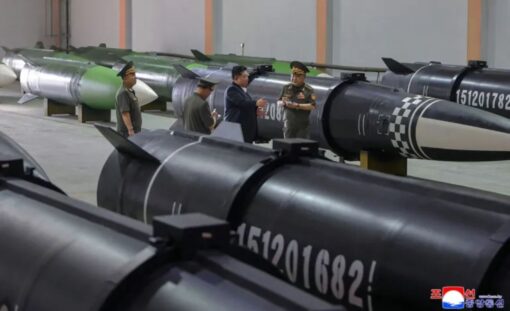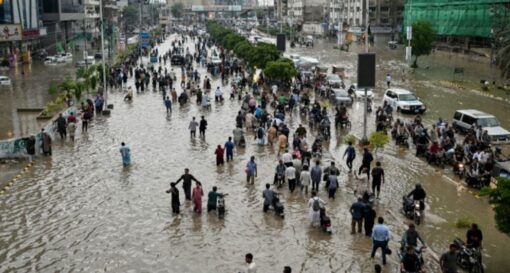North Korea has significantly increased its nuclear stockpile, according to reports from Seoul, raising alarms across East Asia and the wider international community.
South Korea’s Unification Minister, Chung Dong-young, stated that Pyongyang now possesses approximately 2,000 kilograms of highly enriched uranium, with a purity of 90 percent or higher.
This figure, if verified, would be enough to produce nearly 47 nuclear weapons, marking a dramatic escalation in North Korea’s nuclear capabilities. The accumulation of weapons-grade uranium underscores Pyongyang’s commitment to maintaining and expanding its nuclear arsenal despite global sanctions and diplomatic pressure.
South Korean officials highlighted that North Korea is operating four uranium enrichment plants, including the Yongbyon site, which was previously decommissioned but later reactivated. Experts suggest that additional clandestine facilities may also exist, reflecting the regime’s relentless pursuit of nuclear dominance.

The concentration of uranium to weapons-grade levels is a critical step in ensuring a functioning nuclear weapon. According to the International Atomic Energy Agency (IAEA), only 42 kilograms of highly enriched uranium is required for a single nuclear device, which puts the reported stockpile into stark perspective.
The buildup comes amid stalled diplomatic efforts to curb Pyongyang’s nuclear ambitions. Previous high-stakes summits between North Korean leader Kim Jong Un and U.S. President Donald Trump ended without agreement, leaving the country’s nuclear program largely unchecked.
South Korean President Lee Jae Myung, who assumed office in June, has advocated for a more conciliatory approach toward Pyongyang, contrasting with the hawkish policies of his predecessor.
Officials argue that continued designation of North Korea as the “main enemy” and insistence on denuclearization as a precondition for talks under previous administrations allowed the regime’s nuclear capabilities to grow without meaningful restraint.
Analysts warn that North Korea’s expanding nuclear stockpile poses severe risks not only to the Korean Peninsula but also to regional stability and global security. The country’s demonstrated ability to enrich uranium to weapons-grade levels indicates a higher risk of nuclear proliferation and potential testing.
This expansion could trigger an arms race in East Asia, compelling neighboring countries like Japan and South Korea to reassess their security strategies and possibly pursue advanced missile defense programs.
The international community faces significant challenges in addressing the North Korean nuclear threat. While sanctions have long been the primary tool to curb Pyongyang’s ambitions, experts argue that they are insufficient without robust diplomatic engagement.
Minister Chung emphasized that halting North Korea’s nuclear program is urgent but can only be realistically achieved through direct dialogue with Washington. Denuclearization talks require careful negotiation, balancing the security concerns of regional powers while offering incentives that encourage compliance.
North Korea’s nuclear developments also carry profound humanitarian and political implications. The regime’s nuclear ambitions are closely intertwined with its domestic policies, including military prioritization and resource allocation.
Observers note that continued enrichment and weaponization efforts divert essential resources from the civilian population, compounding existing economic and social challenges.
Furthermore, the persistence of North Korea’s nuclear program complicates efforts to achieve lasting peace on the Korean Peninsula, where tensions remain high due to historical conflicts and unresolved territorial disputes.
The United Nations has repeatedly condemned North Korea’s nuclear tests and prohibited weapons programs, yet enforcement remains limited. The Security Council has passed multiple resolutions demanding denuclearization, but violations continue with little accountability.
As a result, North Korea has effectively operated with minimal international constraints, allowing its nuclear stockpile to grow over time. The situation underscores the need for multilateral cooperation and strategic negotiation to prevent escalation and maintain regional stability.

In addition to regional concerns, North Korea’s nuclear buildup has global ramifications. It challenges non-proliferation norms and raises fears of potential nuclear material smuggling or proliferation to non-state actors.
Countries worldwide are closely monitoring Pyongyang’s activities, with intelligence agencies tracking enrichment facilities, missile tests, and technological advancements.
International experts warn that without a coordinated diplomatic and security approach, the growing nuclear stockpile may embolden the regime and destabilize security frameworks in Northeast Asia and beyond.
North Korea’s reported expansion of its nuclear stockpile represents a critical juncture in regional and global security. The accumulation of weapons-grade uranium, combined with operational enrichment facilities, signals Pyongyang’s commitment to maintaining a formidable nuclear arsenal.
Addressing this challenge requires urgent diplomatic engagement, robust multilateral cooperation, and carefully calibrated sanctions that incentivize compliance without exacerbating humanitarian risks.
The international community faces a delicate balancing act: curbing North Korea’s nuclear ambitions while promoting dialogue, peace, and security on the Korean Peninsula.


